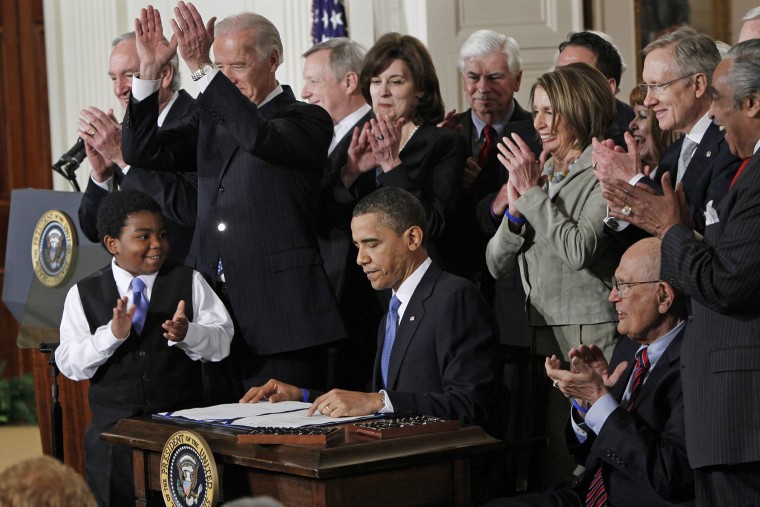Sen. Lindsey Graham (R-S.C.) argued last week that the Affordable Care Act was "designed to fail," as part of an elaborate Democratic ruse., As Graham sees it, those Democrats knew all along that "Obamacare" would collapse, at which point those rascally Dems would open the door to a single-payer system.
This is obviously ridiculous for all sorts of reasons, but let's focus for now on the most pressing truth: the Affordable Care Act is actually doing pretty well. Vox's Ezra Klein explained this morning that the ACA, despite facing real challenges, is both popular and effective, "and that makes it damn hard to replace."
[In the Republicans' telling, the ACA] is always “imploding,” “failing,” “dying,” “disastrous.” How can a law in such crisis command such healthy public support? The answer is that the law is, for the most part, not in crisis. There are areas of the country where the exchanges have struggled to attract insurers, and there are markets in which premiums have increased rapidly. These problems are real and, if the party in power were interested in improving the law, solvable.But even without improvements, the reality is that for most people, in most places, the Affordable Care Act is working.
This isn't just true in the broad sense -- the ACA has, for example, pushed the uninsured rate to record lows -- it's also true when we consider the latest details.
NBC News reported last week, for example, that private insurers participating in ACA exchange marketplaces are seeing increased profits, "a sign that the market is stabilizing and that Republican claims of collapse have not come to pass."
The same report added, "The analysis by the nonpartisan Kaiser Family Foundation examined first-quarter earnings in 2017 and found insurance companies are paying a lower share of premiums out in medical claims than in any comparable period since the law went into effect. The current mix of enrollees do not appear to be less healthy than in the past, an important factor in whether companies can turn a profit."
But wait, conservative readers are shouting at their screens, what about the far-less-flattering news? Didn't we also learn last week about rate increases, a slight uptick in the uninsured rate, and fewer insurers planning to participate in exchanges? If the ACA is fine, what explains the bad news?
The answer to each of these questions is the same: Donald Trump's threats and the Republican repeal crusade have had an effect on the market, and not for the better. That's true when it comes to rate increases, the uninsured rate, and the participating insurers.
The big picture, meanwhile, remains the same. If the ACA were actually collapsing, public support for a Republican alternative would be significant. It's not. On the contrary, when Americans are presented with a choice, by a two-to-one margin, people want "Obamacare."
As Ezra concluded, "The Republican failure to craft an effective replacement for Obamacare isn’t an accident. It’s a function of the fact that Obamacare is largely working, and Republicans who spent years persuading themselves and their base it’s a catastrophic failure are now slamming into that reality."
The biggest fear is not the ACA's collapse; it's the Republican temptation to sabotage the system.
